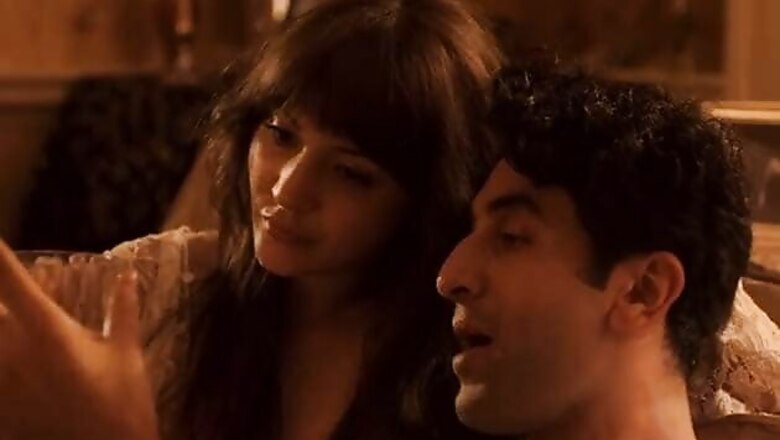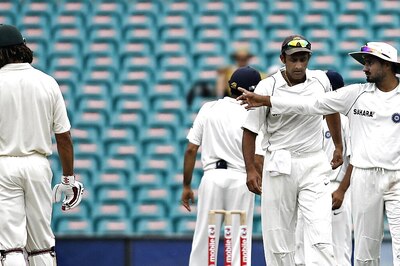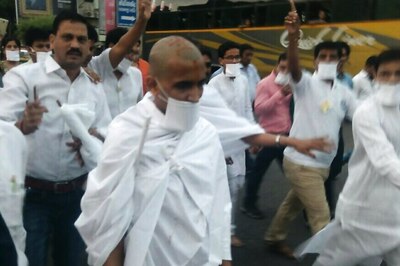
views
Director: Anurag Kashyap
Cast: Ranbir Kapoor, Anushka Sharma, and Karan Johar
Against the flickering light of a black and white movie playing in a theatre, you see the rapt face of petty thief Balraj (Ranbir Kapoor) as he watches the climax of the 1939 gangster classic 'The Roaring Twenties'. James Cagney, shot dead, lies in the arms of Priscilla Lane; she tells a cop, visibly heartbroken, "He used to be a big shot." Balraj is moved, his eyes are moist, and you have a sinking suspicion that you know where director Anurag Kashyap's 'Bombay Velvet' is headed.
While the opening credits reveal that the script is inspired by historian Gyan Prakash's book 'Mumbai Fables', the film itself is primarily about the fictional love story between Ranbir's Johnny Balraj, now a bonafide gangster, and nightclub singer Rosie Noronha (Anushka Sharma). Their relationship plays out against the backdrop of 1960s Bombay, a city on the threshold of becoming a metropolis. All the action is centered in and around jazz-club Bombay Velvet, owned by conniving newspaper baron and bootlegger Kaizad Khambatta (Karan Johar), who makes Johnny his flunkey, but gradually becomes obsessed with him.
On the surface, Johnny is the manager of 'Bombay Velvet', but he actually makes Khambatta's problems go away - by kidnapping, blackmailing or killing people who stand in the way of Khambatta's ambition to transform Nariman Point into Bombay's Manhattan. Other key players include Johnny's childhood friend and sidekick Chiman (a nicely understated Satyadeep Misra), rival newspaper owner Jimmy Mistry (Manish Chaudhary), and an investigating officer who won't give up (Kay Kay Menon in great form).
Subterfuge, blackmail, thwarted love, and at least two unconvincing plot twists - the first involving a coveted negative, the second being the sudden appearance of a twin sibling - all add to this dense script. Yet, despite its overcrowded plot, the film is let down because the love story at its centre feels hackneyed.
That's a shame, because Bombay Velvet has all the trimmings - solid performances, a terrific jazz-soaked soundtrack by Amit Trivedi, and excellent production design that takes you by the hand into the city of the late sixties. But how you wish the script had lingered more on the greedy government-mill-owner-media nexus that took over mill lands to create the urban landscape of Nariman Point. Unfortunately, the film is too often waylaid by Johnny and Rosie's predictable drama. It's perplexing - more than once you catch yourself wondering, "What happened to the story of Bombay?"
It seems as if multiple threads in this narrative were left incomplete, possibly chopped away at the editing table. Coherence, or the lack of it, is a big issue in this film. Characters like Mistry and Mayor Romi Mehta (Siddhartha Basu) aren't entirely convincing, and the Fight Club-inspired underground-boxing subplot is contrived. To be fair, however, the film has some enduring moments: a sweet exchange between Rosie and Johnny in a bathtub, a tense wordless phone call between Johnny and Khambatta, and that mad drum solo that matches the sheer intensity with which Johnny takes on Khambatta, all guns blazing Scarface-style. These are some of the bits that stay with you.
Of the cast, Karan Johar is surprisingly effective in his debut as the snarky, manipulative Khambatta. A scene in which he leaves a room to hide an uncontrollable laughing fit over Johnny's naivete is one of the best in the film. Anushka Sharma as Rosie never feels like an adequately written character. Despite being one half of the film's central love story, it's a part that doesn't come together and is seldom compelling. The actress does much better expressing Rosie's pent-up pain in the marvelously realized Dhadam Dhadam number.
Ultimately, it's Ranbir Kapoor, soldiering on as Johnny Balraj, who infects his part with considerable charm, capturing his hotheaded nature, his bottled fury remarkably. You're riveted by his display of rage against a slimy photographer who threatens Rosie, and likely moved by his grief when he bids goodbye to a close friend. It's Ranbir's performance that glosses over many of the film's problems.
'Bombay Velvet' doesn't have the raw energy or the unforgettable characters of Kashyap's 'Gangs of Wasseypur'. It's never as involving a story as 'Black Friday'. And yet what you cannot deny is the sheer craft that Kashyap brings to the enterprise. This is an ambitious saga; skillfully mounted. You're fascinated by the resemblance to real-life figures, the unwavering attention to detail, and little touches that are vintage Kashyap - like a stand-up comic making political barbs back in the day. The missing piece of the puzzle, sadly, is the inconsistent script ... one that never lets us truly care for the characters, one that leaves too many questions unanswered.
I'm going with two-and-a-half out of five for 'Bombay Velvet'. Much of the film dazzles, but I found myself longing for some soul.
Rating 2.5/5
Write your own review and win prizes
What's your reaction to 'Bombay Velvet'?




















Comments
0 comment